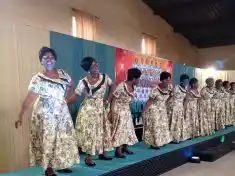
What unfolded at Masintha was not merely a gospel celebration, but a calculated spectacle where piety met politics — and politics won. Ostensibly organized to launch a gospel album and raise K26 million for a church choir’s bus, the event became a revealing lens into Malawi’s evolving electoral playbook. Instead of a modest fundraiser, the stage transformed into a bidding war for public favor, dominated by political heavyweights who outdid each other in largesse, each donation less about charity and more about visibility.
UTM president Dalitso Kabambe opened the contest with a K10 million donation, setting an early tone of political ambition cloaked in spiritual benevolence. DPP’s Alfred Gangata swiftly outmaneuvered him with a K16 million pledge, a move that momentarily handed the spotlight to the opposition. But it was the ruling MCP’s Secretary General, Richard Chimwendo Banda, who delivered the climactic act: a K20 million donation that not only reclaimed dominance for his party but also underscored the strategic timing — just hours before the official campaign season kickoff.
The Masintha Women’s Mass Choir may have walked away with nearly double their goal, but the windfall came at the cost of their cause being co-opted into a wider political narrative. The day’s events were less a celebration of gospel music and more a choreography of political signaling. What transpired was emblematic of a trend where sacred platforms are increasingly commodified — not for worship, but for campaign visibility in key urban constituencies.
The generosity on display, though cheered by the crowd, raises disquieting questions about the integrity of both political actors and religious institutions. When large sums of money flow freely from public officials who offer no clear explanation of their means, skepticism is not just warranted — it is necessary. In a context where civil servants and politicians are not typically known for private affluence, such donations risk being perceived less as philanthropy and more as quiet transactions for future political dividends.
The deeper concern lies in the role of the Church, which risks slipping from being a moral compass to a convenient backdrop for political theatre. By permitting and even celebrating these acts of unchecked generosity, churches may inadvertently endorse — or worse, participate in — a culture of patronage that undermines democratic principles. Faith institutions, long regarded as guardians of ethical clarity, now face the uncomfortable reality of becoming part of the political machinery.
This event, coming on the eve of the 2025 campaign cycle, signals more than just the opening salvos of an election season. It reveals how spiritual spaces are being drafted into service as campaign venues — sanitizing political ambitions with a veneer of religious respectability. The tactic is effective, but corrosive: it blends divine service with political self-service, and it does so in a way that confuses voters and cloaks motives.
If the pattern holds, Malawi could be heading into an election season where sanctuaries double as stages, and every hymn is followed by a handshake — not in fellowship, but in calculated alignment. As campaign season ramps up, so too will the pressure on religious institutions to either uphold their prophetic voice or succumb to becoming instruments of influence. For a democracy already grappling with transparency, this merging of pulpits and podiums could prove as spiritually hollow as it is politically expedient.
In this marketplace of piety and power, the real currency is visibility. And if that is what churches now offer to the highest bidder, the faithful — and the future of democracy — may be the ones left paying the price.



0 Comments